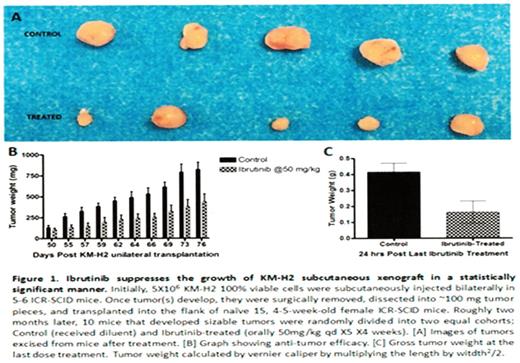Abstract
Introduction: Hodgkin's Lymphoma (HL) is a malignancy of mature (post germinal center) B-lymphocytes that afflicts almost 20,000 individuals annually in North America and Europe. While the majority of patients diagnosed with HL are cured with multi-agent chemotherapy, 15 % of patients are refractory to conventional chemotherapy and almost half of patients with high-risk disease relapse. For these patients few effective therapeutic options exist. Only 3 drugs have been approved in the last 30 years for relapsed HL and novel therapies are needed. Bruton's Tyrosine Kinase (BTK) is a member of the TEC family and plays a central role in B-cell signaling, activation, proliferation and differentiation. Several studies have shown that BTK has been associated with PI3K, mTOR, FAS and NF-κB signaling. Furthermore, BTK can be activated by CD40 ligand binding, chemokines such as IL-6 and activation of toll like receptor (TLR) pathways suggesting a possible clinical role for BTK inhibition in HL.
Methods: Classical HL cell lines (KM-H2, L1236, L-428 and HDLML) were exposed to Ibrutinib (0-25 micro M concentrations for 0-72 hrs) followed by cell death analysis using multiple cytotoxicity assays including trypan blue viability analysis, Annexin V FITC and Histone DNA ELISA apoptosis assays and molecular assays including western blotting and RT-PCR. Female ICR SCID mice were inoculated with KH-H2 by subcutaneous injection (5x106 cells). Once tumors formed ~100 mg tumor fragments were inoculated in 12 mice. Mice were administered either vehicle (N=6) or Ibrutinib (50 mg/kg i.v.) (N=6) daily for 4 weeks. Residual tumor tissue was analyzed for BTK suppression, inhibition of downstream signaling and activation of pro-apoptotic pathways.
Results: Ibrutinib suppressed viability and induced apoptosis in HL cell lines in a dose and time dependent manner (IC50s ~5-7.5 µM in KM-H2, L1236 and L-428). Western blotting and RT-PCR revealed significant induction of apoptotic markers and down-regulation of pro-survival markers. Ibrutinib treatment resulted in suppression of known BTK downstream targets including PI3K, mTOR, FAS and NF-kB. Ibrutinib given at 50 mg/kg i.v. daily for three weeks caused statistically significant inhibition of KM-H2 sub-cutaneous xenograft (Figure 1). Molecular analysis of residual tumor tissue by RT-PCR revealed statistically significant down-regulation of BTK, PI3K, Akt, Rictor, 4EBP1 and related markers. Immunohistochemical analysis of residual tumors for H&E, Ki67, BTK and related downstream signaling is ongoing and will be presented in detail during the meeting.
Conclusion: Our present studies are the first showing in vitro and ex vivo action of BTK inhibition in classical HL. These findings suggest in vitro activity and merit further examination. A phase II study examining the activity of ibrutinib in relapsed or refractory HL is currently enrolling (NCT02824029).
Mohammad: karyopharm therapeutics: Research Funding. Azmi: Janssen: Research Funding; karyopharm therapeutics: Research Funding. Ramchandren: Janssen: Research Funding; pharmacyclics: Research Funding.
Author notes
Asterisk with author names denotes non-ASH members.


This feature is available to Subscribers Only
Sign In or Create an Account Close Modal